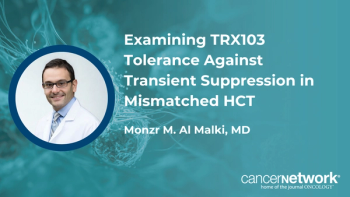
Women on Clinical Cancer Trials at Increased Risk of Severe AEs Across Treatment Modalities
Women undergoing treatment with immunotherapy, targeted therapy, or chemotherapy in cancer clinical trials were at a significantly increased risk of severe adverse effects compared with men.
Women who participated in clinical cancer trials were at significantly greater risk of both severe symptomatic adverse effects (AEs) and hematologic AEs than men across multiple treatment modalities, indicating the presence of broad-based sex differences among those undergoing treatment with immunotherapy, targeted therapy, or chemotherapy, according to results published in the Journal of Clinical Oncology.
Investigators reported a 34% increased risk of severe AEs for women compared with men (OR = 1.34; 95% CI, 1.27-1.42; P <.001), with a 49% increased risk observed among women who received immunotherapy (OR = 1.49; 95% CI, 1.24-1.78; P <.001).
“If confirmed, our findings suggest that underlying mechanisms may result in generalized worse toxicity outcomes for women, with or without corresponding survival improvements or detriments,” the investigators wrote. “Therefore, more awareness of symptom differences or reporting differences in women versus men is needed.”
The investigators gathered data from the SWOG Cancer Research Network on eligible patients evaluable for AE assessment in phase 2 and 3 clinical trials that took place from July 1, 1989, to June 30, 2019. Data for patients enrolled on multiple studies came from the first trial, and no studies with fewer than 10 patients were included.
The primary end point of the analysis was the occurrence of treatment-related severe or greater AEs, defined as grade 3 or higher. Demographic factors including age, race, and pre-study obesity status were included in the regression models for statistical analysis.
A total of 23,296 patients across 202 trials were included in the analysis, of whom 37.9% were women and 62.1% men. Groups were organized by treatment domain and featured 17,417 patients treated with chemotherapy, 2319 treated with immunotherapy, and 3560 treated with targeted therapy.
Gastrointestinal cancer (26.1%), lung cancer (20.5%), and leukemia (12.1%) were the most common cancers included in the analysis. Most patients were White (86.5%) and categorized as not obese (77.0%). Additionally, 34.7% of patients were 65 years or older.
One or more severe AE was observed in 64.6% of patients. Women had a 25% increased risk of experiencing 5 or more severe AEs (OR = 1.25; 95% CI, 1.18-1.32; P <.001) compared with male patients. Further, women were at a 30% or higher risk of experiencing symptomatic (OR = 1.33; 95% CI, 1.26-1.41; P <.001) and hematologic AEs vs their male counter parts (OR = 1.30; 95% CI, 1.23-1.37; P <.001). Moreover, the risk of objective non-hematologic AEs was statistically significantly greater for female patients compared with male patients (OR, 1.08; 95% CI, 1.02-1.14; P = .01).
In terms of limitations, the investigators explained that because patients on clinical trial tend to be younger and healthier than those not on trials, toxicities may be greater in the latter. Moreover, the focus on the most severe AEs in each category limited the ability to observe toxicity patterns over time.
“A better understanding of the nature of the underlying mechanisms could potentially lead to interventions or delivery modifications to reduce toxicity in women (in particular). In such cases, cancer treatment may then be able to be simultaneously modified or augmented, with the ultimate goal of extending therapeutic benefits,” the investigators concluded.
Reference
Unger JM, Vaidya R, Albain KS, et al. Sex differences in risk of severe adverse events in patients receiving immunotherapy, targeted therapy, or chemotherapy in cancer clinical trials. J Clin Oncol. Published online February 4, 2022. doi:10.1200/JCO.21.02377
Newsletter
Stay up to date on recent advances in the multidisciplinary approach to cancer.










































